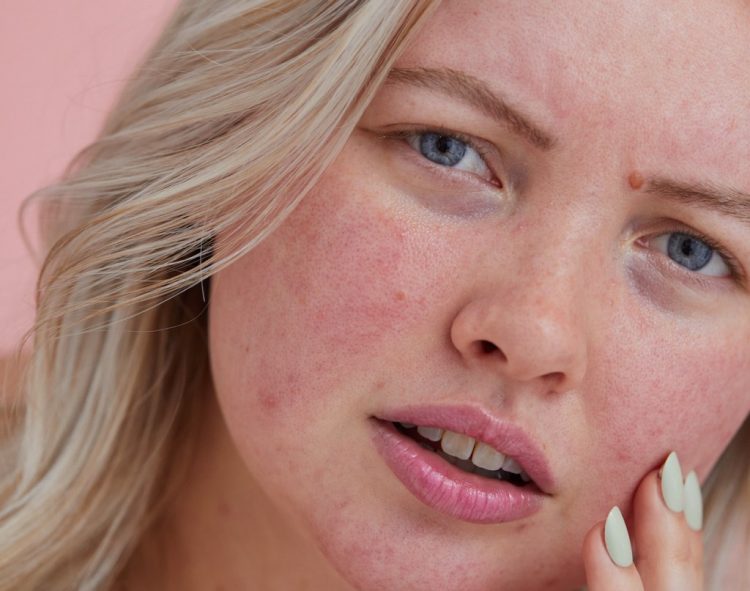The skin barrier is having a moment, and we say it’s about time. This oh-so-important lipid layer on the surface of our skin is finally getting the attention it deserves — on TikTok, #skinbarrier has nearly 300 million views — as people are finally acknowledging to just how essential keeping it intact is to our overall skin health.
As our skin’s first line of defense, it’s responsible for protecting us against environmental aggressors and locking in moisture—an important job, indeed. With that in mind, it’s no surprise that nearly all of the most common skin conditions can be traced back to a weakened skin barrier — and that includes acne.
The barrier-breakout connection
When we talk about breakouts, we usually point to bacteria clogged pores as the major culprit. And while those elements can certainly play a role (pimples pop up when dirt, grime, and oil get trapped beneath the surface of our skin), a compromised skin barrier can make things a whole lot worse.
“While there is no direct relationship between a compromised skin barrier and acne, we do know that a weakened barrier can certainly inflame pre-existing acne and can flare up many other skin conditions,” says Rachel Nazarian, M.D., a board-certified dermatologist based in New York City. “The way it does this is through increasing the inflammatory mediators in the skin, and making skin more inflamed.”
So, while you may very well experience superficial breakouts on top of a healthy skin barrier, if that barrier isn’t functioning properly, those breakouts will turn into the inflamed, painful pimples that nightmares are made of.
How treating breakouts impacts the barrier
Here’s the catch 22, though: Most acne-fighting actives are designed to be drying — their main goal, after all, is to get rid of the dirt and oil clogging your pores. That inherently strips your skin and weakens its barrier. So in pursuit of trying to treat your pimples, you may actually be exacerbating them further. According to Dr. Nazarian, this means that you need to be extra thoughtful in the way you curate your routine.

To start, you’ll want to stack your regimen with barrier-enforcing ingredients that will help counteract the drying and stripping effects of your acne products. “The best way to manage acne while keeping the skin barrier healthy is to decrease the strength of your cleanser, using only gentle non-foaming ones,” she says. “It’s also wise to increase your level of topical hydration and moisturizing, by using products that are calming and those that can strengthen the skin barrier. Look for ingredients such as hyaluronic acid or ceramides.” In the market for both? Look to the Plum Plump Hyaluronic Serum and Avocado Ceramide Recovery Serum for hyaluronic acid and ceramides, respectively — which, we should note, are a powerful, synergistic combination of ingredients — and then follow them up with Plum Plump Hyaluronic Cream.
Most importantly, though, you’ll want to find acne-fighting formulas that aren’t overly aggressive on your skin — and that’s where the new Strawberry Smooth BHA+AHA Salicylic Serum comes in. The formula is made with a blend of alpha and beta hydroxy acids, which work together to clear away the dirt and debris that cause pimples. The AHAs (namely, malic and mandelic acid, which are two of the gentlest exfoliating acids on the market) work to melt the glue that holds pore-clogging dead skin cells to the surface of your skin, while salicylic acid deeply penetrates your pores to clean them from the inside out.

While the acids are working to clear up your complexion, hydrating and calming ingredients like hyaluronic acid (which works like a sponge to draw water into your complexion), allantoin (which soothes irritation), and bisabolol (which promotes healing) work to fortify your skin barrier.
“Salicylic acid and malic acid are less irritating acne fighting ingredients, and the addition of hyaluronic acid improves the hydration abilities of skin, offsetting some of the dryness,” says Dr. Nazarian, who recommends the product as a solid starting point in an acne-treatment plan. The formula is gentle enough for sensitive skin types, but that doesn’t mean it isn’t effective: In a four-week study conducted on 31 participants, 100% found that the serum reduced their blackheads, and 96% agreed that it had reduced their breakouts and blemishes.
Finally, if you use a product containing retinol, which actually increases skin cell turnover and can lead to dry, flaky skin when used too often and too quickly, be sure to incorporate it into your routine slowly (think two to three times a week) and build up your tolerance from there — and buffer its effects with gentle, barrier-supporting products like Avocado Ceramide Recovery Serum.
As with adding any new product into your routine, you’ll want to pay close attention to how your skin responds. “Introduce active acne-fighting ingredients to your skin very carefully, typically once or twice a week, monitoring for irritation, so that you can titrate based on how your skin handles it,” says Dr. Nazarian. “Discontinue all unnecessary products that can be drying or irritating while starting your acne regimen.” Then, you’ll be well on your way to clear skin and a strong barrier.
Keep reading about the power of the skin barrier:
Source by blog.glowrecipe.com


